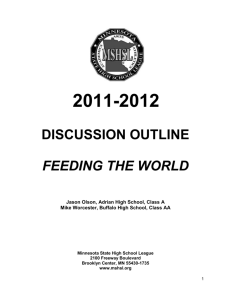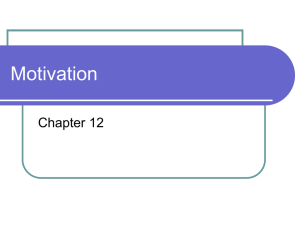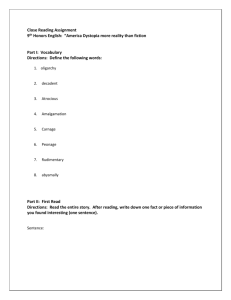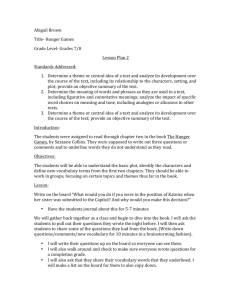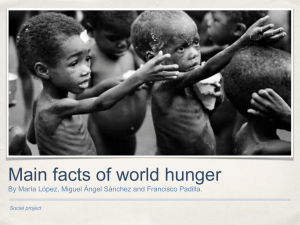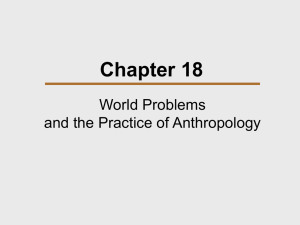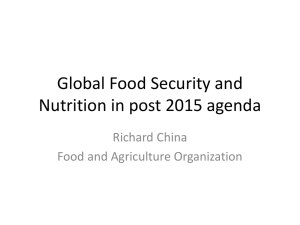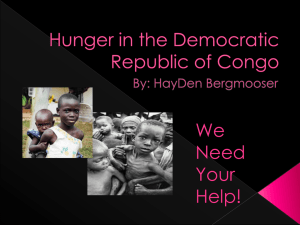University of Minnesota Duluth
advertisement
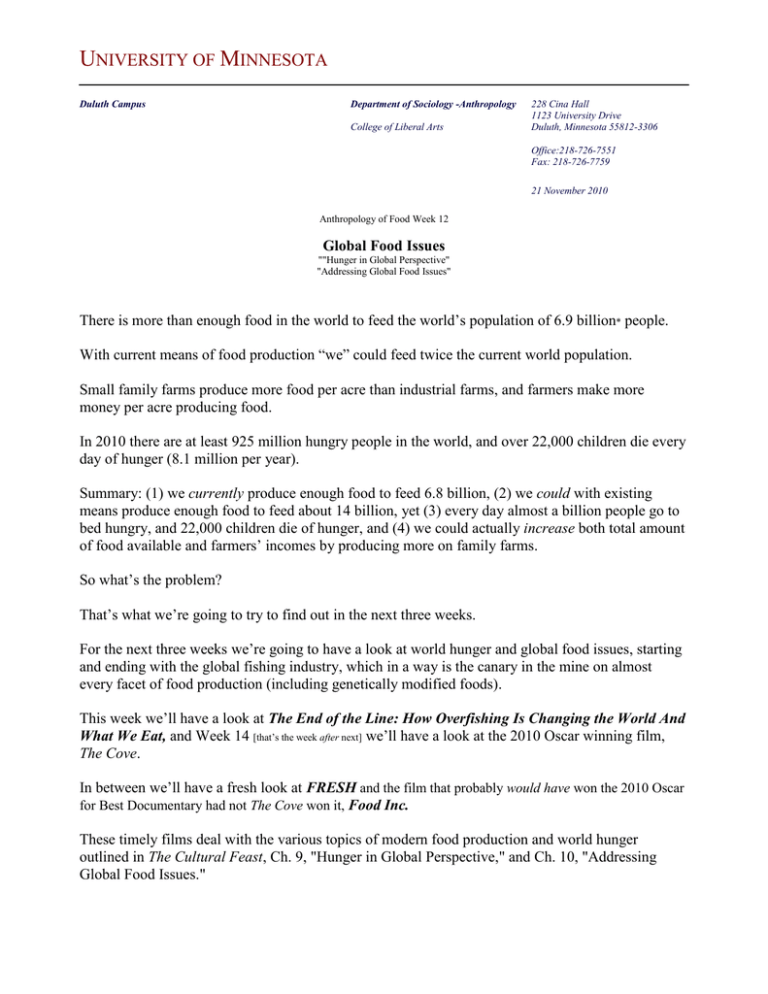
UNIVERSITY OF MINNESOTA Duluth Campus Department of Sociology -Anthropology College of Liberal Arts 228 Cina Hall 1123 University Drive Duluth, Minnesota 55812-3306 Office:218-726-7551 Fax: 218-726-7759 21 November 2010 Anthropology of Food Week 12 Global Food Issues ""Hunger in Global Perspective" "Addressing Global Food Issues" There is more than enough food in the world to feed the world’s population of 6.9 billion* people. With current means of food production “we” could feed twice the current world population. Small family farms produce more food per acre than industrial farms, and farmers make more money per acre producing food. In 2010 there are at least 925 million hungry people in the world, and over 22,000 children die every day of hunger (8.1 million per year). Summary: (1) we currently produce enough food to feed 6.8 billion, (2) we could with existing means produce enough food to feed about 14 billion, yet (3) every day almost a billion people go to bed hungry, and 22,000 children die of hunger, and (4) we could actually increase both total amount of food available and farmers’ incomes by producing more on family farms. So what’s the problem? That’s what we’re going to try to find out in the next three weeks. For the next three weeks we’re going to have a look at world hunger and global food issues, starting and ending with the global fishing industry, which in a way is the canary in the mine on almost every facet of food production (including genetically modified foods). This week we’ll have a look at The End of the Line: How Overfishing Is Changing the World And What We Eat, and Week 14 [that’s the week after next] we’ll have a look at the 2010 Oscar winning film, The Cove. In between we’ll have a fresh look at FRESH and the film that probably would have won the 2010 Oscar for Best Documentary had not The Cove won it, Food Inc. These timely films deal with the various topics of modern food production and world hunger outlined in The Cultural Feast, Ch. 9, "Hunger in Global Perspective," and Ch. 10, "Addressing Global Food Issues." Anthropology of Food, Week 12, p. 2 And these films should all bring back memories of our discussion of food production in industrial societies, in Weeks 7 and 8, and the discussion of the same topic in The Cultural Feast, Ch. 6, "Food Technologies How People Get Their Food in Industrialized Societies." It would be a good time to review Ch. 6 and your notes on the films Our Daily Bread, We Feed the World, and Food Fight. (The final exam is just around the corner.) And in the United States this week we give a great big thanks—and for most of us that will be for and with the sacrificial offering of a great big New World bird that has been industrialized to the point where it cannot reproduce without the help of humans, and to grow quickly to the point where it can barely walk. But that stuffed bird might be appropriate, even symbolic (speaking of food symbolism) for the U.S.A. celebration where the participants themselves can often barely walk after eating the sacrificial bird and all its trimmings and accompanying dishes. So enjoy that, but don’t forget this year (if you’re celebrating Thanksgiving this week) your Thanksgiving Day is also an Anthropology of Food Lab Day, and we look forward to your report as you relax on World Buy Nothing Day (aka “Black Friday”). [See a wonderful book, by Barbara Kingsolver, Camille Kingsolver, and Steven L. Hopp, Animal, Vegetable, Miracle: A Year of Food Life. (NY: HarperCollins, 2007. <www.animalvegetablemiracle.com/>) for details on humans and turkeys.] Enjoy the day, and the day off, and that big fat turkey that couldn’t reproduce itself and could barely walk when it met its maker (probably in Minnesota, as Minnesota is the biggest turkey producing state in the U.S.A.). As usual, if you have any questions about food, please let me know. And also as usual, be sure to check the details of the activities and assignments of the week on your HomePage. And get them in on schedule. Giving Thanks, Tim Roufs Sources: Marion Nestle, 2010, and others. *The world population is estimated at 6,882,200,000 (U.S. Census Bureau). FAO Statistics <http://www.globalissues.org/article/715/today-over-22000-children-died-around-the-world> I(nternational) Buy Nothing Day <http://www.ecoplan.org/ibnd/ib_index.htm>
